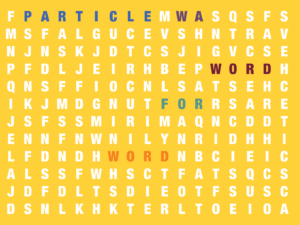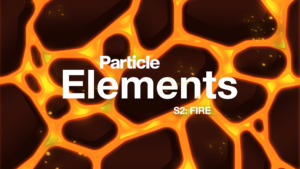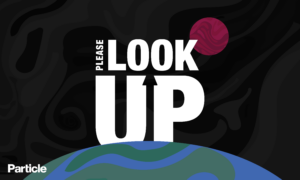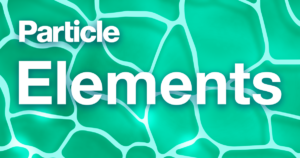Transcript
Why Become A Teacher
- Host: Rose Kerr
- Guest: Ehsan Warasi
**Cue music (intro theme)
Rose Kerr: Welcome to the Particle Podcast where we talk about science and the people who just love it. My name is Rose. And like most people right now, I’ve been stuck at home almost every day for the past few months. But the podcast must go on. Today, I’m delighted to be joined by Ehsan Warasi, passionate teacher and eager engineering student who says his science story started way back in a refugee camp in Iran.
Rose Kerr: Welcome to the podcast, Ehsan.
Ehsan Warasi: Thanks for having me Rose.
Rose Kerr: Oh, no worries at all. And thank you for joining us even by distance. The audience won’t be able to see us right now. But I’m under a blanket for it and you’re recording in your lounge room so it’s a bit of a weird situation.
Ehsan Warasi: Yeah, considering the climate now with COVID-19. I hope it goes well.
Rose Kerr: I’m going to start off by asking something that sounds really basic. But it’s really important to start with, what do you actually do?
Ehsan Warasi: So I’m a science and mathematics teacher at Balcatta Senior High School. I also studied towards my Master of Teaching and also a Master of Engineering. So a lot going on in my life at the moment.
Rose Kerr: So you’re still studying whilst being a teacher?
Ehsan Warasi: Yes, I’m part of this program called Teach for Australia.
Rose Kerr: Jumping in for a second, the program Ehsan is a part of his Teach for Australia. It’s a program for people with different study backgrounds to get them into teaching. It’s a nonprofit organization aimed at improving education.
Ehsan Warasi: Which I highly recommend your listeners to have a look at, which is designed to attract people from other disciplines into teaching.
Rose Kerr: Ah thats really interesting. So the idea is that you have a different study background and then bring that into your teaching.
Ehsan Warasi: Yes, yes. Hence My engineering background, I studied engineering and finance at the University. I applied for this program, mainly because I like working with youth and got into it and really thoroughly enjoying it at the moment.
Rose Kerr: What inspired you to decide to pursue teaching as opposed to just going into being an engineer?
Ehsan Warasi: I suppose I did a little bit of engineering work and a little bit of finance work at one of the consulting firms and also the youth work throughout my degree and really enjoyed the youth work and really working with youth. There’s a genuine authenticity about working with kids, teenagers, and I really enjoyed it rather than the dull life that is corporate life.
Rose Kerr: I love that description of kids being authentic and genuine. I’ve also worked with kids and that’s very, very true. Well, what age group do you teach?
Ehsan Warasi: So, at the moment this year, I’m teaching you nines, 10s, and two year olds, so
Rose Kerr: Do you find that they like learning science?
Ehsan Warasi: I’m teaching your 12 physics, which is very heavy, heavily content driven. And a lot of it is real life science, which my students enjoy it. At least that’s my perception.
Rose Kerr: (laughs) at least we’re hoping.
Have you always been interested in science?
Ehsan Warasi: Yes. I’ve always been interested in making and building things. I remember from when I was a kid, I always tried to dismantle electronic devices and just try and learn how things work really. And I figured studying science really acted as an enabler for me to do that.
Rose Kerr: That makes a lot of sense. Do you remember some of the things you would have tried to take apart or build when you’re a kid?
Ehsan Warasi: I was living in refugee camp in Iran. So there wasn’t anything that could really do. I am from Afghanistan, and we were living as illegal migrants in Iran. So there wasn’t much that I had to dismantle. But I remember I dismantled a radio cassette and tried to figure out the circuitry inside it and managed to learn some things. Yeah. Probably caused me some trouble…
Unknown Speaker
Especially if you weren’t meant to pull it apart in the first place.
Ehsan Warasi: Yes. I wasn’t meant to. Yes.
Rose Kerr: That’s something I wanted to talk about. So you grew up in a refugee camp- what What was that environment like?
Ehsan Warasi: Ah, surprisingly, for me, I think it worked to my advantage. I built a lot of resilience and persistence and What I wanted to achieve in life, I think it had its challenges. We didn’t have many things the school I was going to- it was just a house setup as a school. We didn’t have really any chairs or desks to sit on. I guess that’s an environment that I liked learning in. There was not much barrier between a classroom and outside. A style of classroom which I think worked in my benefit. But also it was the challenges, not being able to afford things and not have it receiving that quality teaching that other kids would have received.
Rose Kerr: Is it a bit of a stark contrast than being a teacher yourself now and teaching in a school in Australia?
Ehsan Warasi: There certainly is. In terms of what I have been able what I was able to have access to and what our students here are able to gain access to, there are stark contrasts in that regard. And also the travel between home and school, it would have taken me an hour to get to school. So all of those would have affected my learning, but I try to look at the positives and what I could what I got out of it, yes.
Rose Kerr: And you obviously got a love for science, you know, like you’ve continued on with that passion.
Ehsan Warasi: Yes, yes, I guess I always had a wild sense of curiosity and the resilience that I built through my years at school and who in my life there in the refugee camp in Iran really enabled me to build that resilience and which is a requirement of what you can do what you can, like give gave me the strength to follow my passions.
Rose Kerr: Yeah, especially how old were you when you came to Australia?
Ehsan Warasi: So I came to Australia by boat in 2010, spent a year – I was 15. At the time, I spent a year in detention centers across Australia and got my refugee status in 2011. Yeah, and have been here in Australia, here in Perth ever since, and thoroughly enjoyed my time here.
Rose Kerr: So what year would you have gone into when you left the detention center and went into school?
Ehsan Warasi: So I didn’t know the language English.
Rose Kerr: Oh my goodness.
Ehsan Warasi: I managed to learn English in detention center. The year that I have spent three months in an intensive English course at Cyril Jackson Senior High School Senior Campus here in Perth, and then went straight into year 11.
Rose Kerr: That’s amazing. That’s crazy that you’ve managed to come over to Australia, learn a foreign language and in a really difficult circumstance and then make it in to year 11 and 12, which are obviously the hardest years at school. And I have heard that you did quite well at school.
Ehsan Warasi: Yes, I was lucky enough to get a good ATAR and thanks for the great teachers that I had that at Aranmore Catholic college and then something that really kick started my interest in becoming a teacher because of the teachers that I had there. And yeah, did a course called Bachelor of Philosophy at UWA, majoring in engineering and finance, did an honors degree at UW A and now enrolled in both Master of Engineering and Master of teaching so…
Rose Kerr: you really enjoy it!
Ehsan Warasi: Yeah.
Rose Kerr: Are you someone who finds it easy to apply yourself to studying? Because there would have been a lot going on – you’re adjusting into a new school you’re away from family, and then you’re also studying at a high level. Are you someone who’s able to- were you able to balance those things? Was it difficult emotionally?
Ehsan Warasi: It was difficult, there were certainly moments that I felt like I needed- I wanted to give up. But again, that resilience that I built through years, really helped me and the encouragement that I received from my teachers from the friends that I had around. Yeah, and my own sense of curiosity, and, and also the sense of appreciations that I have once you see things. Once you know you are able to access things that many people across the world are not able to. You build that sense of content and appreciation and try to make use of the opportunities that you have.
Rose Kerr: Definitely. Is that something that you try to explain to your students because they only know one kind of life?
Ehsan Warasi: Yes, certainly. I don’t really talk about my background a lot. But I do say that I didn’t have the opportunity said you had you had and I try to inspire them, either my personal story or other things on to really kickstart their curiosity and their sense of wanting to learn.
Rose Kerr: What is it that gets you excited in science? What kind of things make you go, oh, I want to be able to do that, or I want to find out how that works?
Ehsan Warasi: So obviously, my passion was has always been making and building things and hence while I was studying engineering, and still do. I guess that’s a sense of how science can be used to better our quality of life and also how science really fulfill my own sense of curiosity of how the world works and how nature behaves.
Rose Kerr: It’s crazy what how you can turn ideas into an actual product and a thing that you can make. That’s a part of engineering, I never did engineering – I have a biology background. But that’s something about engineering and that part of science thats just like mind blowing.
Ehsan Warasi: Yes, absolutely. I am teaching year 12 physics and there’s a lot of applications of the physics that they study in year 12. To their life, like their day to day life, I use a lot of their day to day appliances or things that they have in their own households to teach. For example, today, I was doing induction stoves and microphones and how principles of electromagnetism enabled us to invent those appliances.
Rose Kerr: Do you consider yourself a bit of a science nerd?
Ehsan Warasi: I don’t! Maybe I should!
Rose Kerr: (laughs)
Ehsan Warasi: but I think the more you learn the more you realize that you don’t know. Yes, that’s certainly something that’s been happening to me and that keeps me motivated to learn more and more.
Rose Kerr: Yeah, it’s never ending. Did you enjoy your time at university? Or your, ongoing time I should say.
Ehsan Warasi: Yes, absolutely. I made some great friends and still in the process of making friends
Rose Kerr: (laughs) that doesn’t stop.
Ehsan Warasi: Yeah. And, and really enjoyed what I was studying as well. Also the finance as my second major at university and really enjoyed that side of my studies as well I guess not science related, but I guess Economic Sciences and science as well.
Rose Kerr: yeah, yeah. I don’t often think about that. I suppose it is a bit of a science.
Ehsan Warasi: Yeah! And also really enjoyed the my honors thesis project.
Rose Kerr: So what did your honors project involve? What was it about?
Ehsan Warasi: It was wastewater treatment, I was working on developing a process to synthesize metallic ionic particles from wastewater by using biodegradable materials such as algae to extract those toxic- often toxic- metallic particles from wastewater.
Rose Kerr: Yeah, okay, that is a challenge. That’s like combining a whole bunch of different sciences together. Do you like that part of having to really think outside the box and come up with solutions to a problem?
Ehsan Warasi: Yes, absolutely. And that is something I encourage amongst my own students, not really confining themselves to the set parameters. And that’s where high order thinking comes in which, which encourages developing of those analytical and critical thinking, which I think is lacking at the moment in our education system is something that I am trying to incorporate into my teaching.
Rose Kerr: Going right back to when you kind of first got into Australia, you like, like you study and you teach in a language that’s not your first language. That must be challenging.
Ehsan Warasi: It is. It was at the beginning. Sort of used to it now I yeah. In the beginning, I would struggle with literacy. I was always good in terms of numeracy aspects of things. But I struggled in terms of literacy, but then I guess through perseverance and effort, you can achieve what you set to achieve.
Rose Kerr: working hard.
Ehsan Warasi: Yes. Keep in mind that I was doing almost 20 hours of part time work as well. So
Rose Kerr: Oh, my goodness!
Ehsan Warasi: Yeah, it wasn’t easy.
Rose Kerr: Wow, that is incredibly hard. Did you find it hard to relate to your peers who presumably a lot of them probably wouldn’t have worked, most of them would have been going to the same school since they were four years old. Was it hard to find people to connect with?
Ehsan Warasi: It was in the beginning. But I guess the year 11 was difficult, because coming from another culture, adjusting to another culture, and being a teenager, it takes time to develop those social skills that you need to be able to socialize with everyone and connect to people. But I started getting good at it towards, year 12. And year 12 also a my main focus was really performing actually academically and being able to score good ATAR results. But I was always able to socialize, I still hang out and I still talk to a lot of my high school friends.
Rose Kerr: I mean, all that you’ve managed to balance so many things in your life, and then still achieve so much and then still want to give back as a teacher. Are you never just tired?
Ehsan Warasi: I am to be honest, but if you set goals and plan things and organize your life, you start to establish routines and when you start reaping the benefits of those you –
Rose Kerr: Yeah
Ehsan Warasi: -you get quite good at it. And the fact that Australia saved my life. The Navy literally pulled me out of a sinking boat, and I always wanted to give back to Australia. I always appreciated what Australia has given me and always had that desire and want and motivation to give back.
Rose Kerr: Why do you think people should care about science?
Ehsan Warasi: I guess, science is a great enabler. Even if your students or your listeners don’t end up doing something scientific don’t end up in science. I think science- studying science enables, first of all, you get a lot of your questions answered.
Rose Kerr: Yep (laughs).
Ehsan Warasi: Yeah (laughs). Secondly, it’s interesting stuff like the physics content that I teach are directly applicable to our quality of life. And also the second half of this physics year 12 curriculum is modern physics, which relates a lot of special relativity, staff and speed of light, which, which are fascinating. They deal with the nature of our reality, a lot of interesting stock of stuff that I see those aha moments amongst my students, which are really awesome to see. And also, studying science develops those critical and analytical thinking skills that are required in every workplace nowadays.
Rose Kerr: Yeah, yeah. It’s helping them and setting them up for their future as well.
Ehsan Warasi: Yes, yes. So, yeah, I highly encourage your listeners to pursue a career in science and not only because it’s fun, it’s also it also helps them long term in terms of their career options.
Rose Kerr: What would you like to achieve in your career?
Ehsan Warasi: My dream has always been from then on as a kid to make and build things. So I would I would like to go into I’m setting up my own manufacturing and making things business. But that’s probably after a few years of teaching. I am thoroughly enjoying teaching at the moment and see what what lies beyond I guess. Yeah, yeah, maybe I could do something in the education space.
Rose Kerr: I want to ask about misconceptions you may have experienced in your life, whether that be you know, when you first came to Australia, or maybe in your career or maybe just with people that you’ve met in your day to day life, what misconceptions do you find that people have?
Ehsan Warasi: I guess one of the misconceptions that I personally experienced the about me is the fact that I came by boat as a refugee people expect me not to be successful. I did it. I had to come here because I spent my entire life at a refugee camp waiting to be accepted somewhere through United Nations which I wasn’t. And I had to leave because Iran wasn’t my country and I could not go back to Afghanistan because of persecution. So and also the misconception that because I’m a refugee, I must not be successful or I must not be able to do the things that I am doing- is really disheartening. I think it’s not about how you came here. It’s about how you took the opportunities that you’ve been given. I always live by that mantra. I’ve been given an opportunity here in Australia and I decided to take it.
Rose Kerr: Absolutely. I mean, just from what we’ve talked about today, I think it’s- it’s unable to be argued with you’ve taken opportunities and worked so hard to get where you have today.
Ehsan Warasi: Yes, yes.
And I encourage a lot of other people who might come from a migrant background to take the opportunities that are available to them. It’s Australia is a great country. We have a great culture and society, a multicultural society.
Rose Kerr: Is there something that you wish people just knew? Maybe that’s something you wish people knew about you or maybe about your story or maybe even about being a teacher? Is there something that if people knew it just be a lot easier?
Ehsan Warasi: I think if we talk in our school context, I wish my students knew, to some extent, a lot of them know but not all of them is that teachers really care about how students feel as well as perform and I try to make known to my students that If you have issues come and talk, the teachers at schools are not just teachers, they are psychologists, carers, they are pastoral carers. And I wish a lot of students have come forward and shared more and sought help. If we, if me as a teacher was able to make a difference to a student’s life, I would absolutely be delighted to do that because I’ve had teachers who influenced me and really changed the trajectory of my life. So I’ll love to be able to do that as well. In fact, one of the reasons I became a teacher was that because I’ve had some teachers myself.
Rose Kerr: And to finish up with, I would like to ask for your science fun fact.
Ehsan Warasi: I guess one of the fun facts that I tell my students is the energy cycle and how we all energy on Earth. Not all but the majority of useful energy that we have on earth comes from the sun, despite only a fraction of the sun’s energy reaching the earth through radiation, where it is where plants are able to use that radiation to convert light to carbon dioxide and eventually food for us, humans and other animals, yeah, and creating the weather systems that I have- I’ve always been fascinated by the energy cycle myself, and how oblivious we are to the fact that sun’s energy affects every aspect of our life.
Rose Kerr: Yeah, I 100% agree that is one of those cases where science is taken for granted -something that happens all the time! We forget about it constantly.
Ehsan Warasi: Yes, yes, absolutely. I mean, if you just explore like the amount of science or demand of uses that we are able to get out of it is phenomenal.
Rose Kerr: As a botanist, I especially appreciate that science fun fact. So thank you so, so much for joining us today on the podcast.
Ehsan Warasi: Thanks for having me. I really enjoyed talking with you as well.
Rose Kerr: Thanks for listening to the Particle Podcast. You can find more of our content on all of the socials as well as that particle.scitech.org.au. This episode, as always, was recorded in the wonderful science hub that is Western Australia and Particle is powered by Scitech.
Transcribed by https://otter.ai






